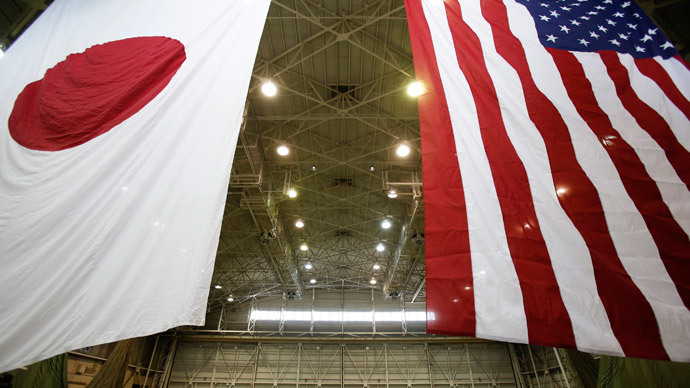‘Japan looking to hedge its bets in counterweighting China’

Afraid of US failure, Japanese PM Shinzō Abe is developing his own independent process of Chinese encirclement, deepening relations with Vietnam, Philippines and India, expert in Asia-Pacific affairs Joseph Gerson told RT.
RT:The Japanese Prime Minister Shinzō Abe is trying to change the so-called "peaceful constitution" adopted after the Second World War to allow its troops take part in conflicts abroad. Does it mean that the days of Japan as a pacifist state are over?
Joseph Gerson: It has been over for some time. Japan, despite that its constitution says it should have no military forces, has very large navy, very large air force, it is the sixth-biggest military spender in the world. But it has been difficult to deploy those forces abroad, to be involved in war and both under the pressure of the right wing in Japan and from the US there has been a process over more than 30 years now to overcome the limitations of the Constitution. And that is what Abe is doing.
RT:There are reports that ultra-nationalist sentiment is gaining momentum among the Japanese, especially young people. To what extent it that true, and if so, how could this impact Tokyo's foreign policy?
JG: All you have is the dynamic in which the conservative governments of a number of years have been trying to make the education, socialization process in Japan much more conservative, moving to require people to stand and sing the Japanese Emperor-worshipping, anthem at the time of high-school graduation, bringing the flag back. And you have the reality in which Japanese young people are not really taught their history. That combined with the rise of China and the economic stagnation in Japan have led to a high drift to the right. And this was spiralled on by the former right-wing governor of Tokyo Ishihara when he moved to buy the Senkaku [Diaoyu] Islands, knowing that the Chinese will overreact and it will drive the Japan’s political system more to the right.
RT:China and South Korea, who suffered at the hands of the Japanese during the Second World War are particularly suspicious of Japan's military ambitions. What do you think they are most concerned about?
JG: They are concerned because you have a country that does not recognize they have committed aggression and afraid of what Japan might do in the future. With the Abe government it refused to concede that more than 35 years of Japanese brutal colonialism in Korea was what it was. The Prime Minister Abe has got to visit Yasukuni Shrine where the spirits of war criminals are said to be, he threatened to revisit an apology on comfort women. He has been clear that he wanted to undo the post-war system in Japan. He wants somewhat to return to some early 1940s or 1930s.
RT:How could Japan's possible militarization affect regional stability?
JG: Even the US has been quite concerned about what Abe might do. Most dangerous are the tensions over the Senkaku [Diaoyu] Islands, uninhabited rocks which both Japan and China claim as theirs. Relations over several years you had rather intense naval and air tensions in that area, and military tensions there. The fear from the US is that Abe might be a little bit too aggressive by perhaps shooting down the Chinese air plane. And the US who wants to maintain its regional dominance with then have to honor the US-Japan military alliance and come to on the Japan side. That could lead ultimately to the US-Chinese war, a potentially nuclear war that could end up all life on Earth.
RT:What are the reasons for the US supporting the Japanese leadership's s drive to militarize their country?
JG: The US has long pressed Japan to revise its constitution. It goes back as far as really the Korean War and the Chinese Revolution - both in the Cold War - and now the US sees Japan as a part of the process of encircling or putting a foundation for encircling China. Interestingly, Abe played this role with the US but he also is looking to hedge his bets being afraid that maybe in crisis the US wouldn’t come through. So Abe has been developing his own independent process of encirclement of China, deepening relations with Vietnam, with Philippines, with India in order to reach its own encirclement of China.
RT:Japan possesses cutting-edge nuclear technology with some experts estimating that it could develop a nuclear weapon within the space of a few months. Do you think Japan will go down this route after the constitution is changed?
JG: I do not think they will do it any time soon. There are a lot of obstacles, both political and diplomatic, as well as technological. What I have read is that it will take them several years to do that. One of the things that would drive Japan in that direction would more North Korean nuclear tests. The government certainly used the fear of North Korea to press militarization. So I do not think it is going to happen any time soon and Japanese people still have very deep allergy to nuclear weapons given the history of Hiroshima and Nagasaki.
The statements, views and opinions expressed in this column are solely those of the author and do not necessarily represent those of RT.
The statements, views and opinions expressed in this column are solely those of the author and do not necessarily represent those of RT.












